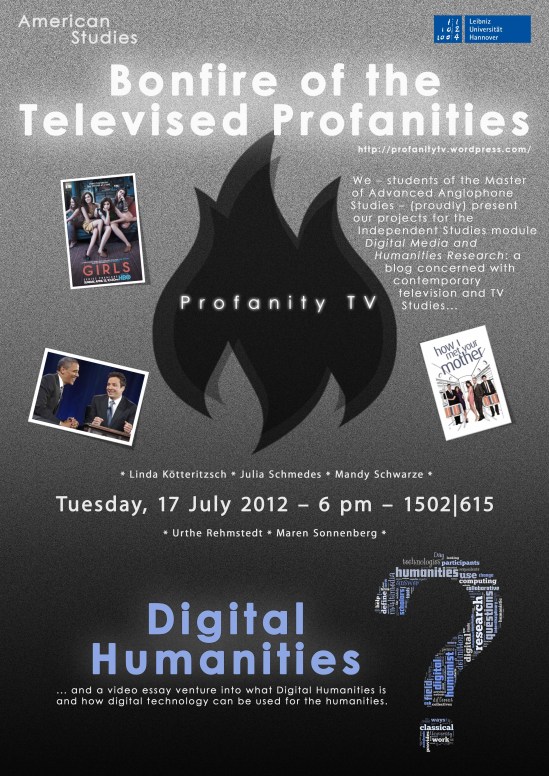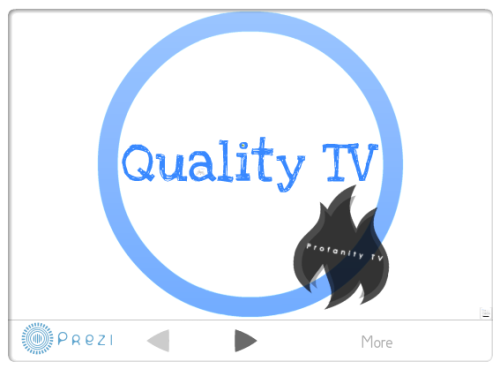On Tuesday, July 17 (6:00 pm, room 615 of the “Conti-Hochhaus” at Königsworther Platz 1), the participants in my independent studies course on “Digital Media and Humanities Research” will present their projects at an event that is open to all interested parties. Linda Kötteritzsch, Julia Schmedes, and Mandy Schwarze will discuss their blog, “Bonfire of the Televised Profanities,” and its significance at the intersection of TV studies and digital media, while Urthe Rehmstedt and Maren Sonnenberg will approach questions around the digital humanities through the medium of the video essay. Spread the word, and check it out if you can!
Tag: independent studies
Quality TV (Prezi @ Profanity TV)
Recently, I asked the participants in the independent studies course on “Digital Media and Humanities Research” to experiment a bit with presentation software, including the freely available Prezi — which the students running the “Profanity TV” blog did with very impressive results: here is their elaborate presentation on Quality TV. (And in case you missed it, make sure you check out their introductory “trailer” video for the site, which explains what the blog, i.e. their project for the course, is all about.)
Profanity TV
For the independent studies course I’m directing this semester on the topic of “Digital Media and Humanities Scholarship,” three students have set up a nice looking blog, Bonfire of the Televised Profanities (or “Profanity TV” for short), which went online today. They’ve even put together a video “trailer” for the blog, which provides some context and gives a taste of what they’ll be doing there. Check it out!
Independent Study: Digital Media and Humanities Research
Course description for an independent studies course I’ll be teaching in the summer semester (April – July 2012):
Independent Study: Digital Media and Humanities Research
SE 2: nach Vereinbarung
Veranstalter/in: Denson
AAS6
This course is designed to accompany the seminar “Cultural and Media Theory: Media in Transition,” but it is open to all students in the Master of Advanced Anglophone Studies program for fulfillment of the “Independent Studies” module. Students in the course will investigate the impact and relevance of digital media for contemporary humanities research (including studies of literature, popular culture, film and other media). Beyond conducting a theoretical inquiry, however, we will be concerned with learning to use and evaluate the techniques, tools, and methods implemented in the “digital humanities” (DH) and related areas of academic research. Thus, we will experiment with applications for textual analysis, data visualization, digital video editing, social media, and blogs, to name a few, and put them to work in academic projects. Together, students will agree on a forum for the joint presentation of their work and organize a concluding event.
Students interested in participating should start familiarizing themselves with online discussions of “digital humanities” and looking at some of the tools used in various DH projects.
Required Reading
Please refer to the course page on StudIP.
Recommended Reading
n/a Assessment Tasks – will be specified ● Registration – StudIP 1.3.2012 – 31.3.2012 ● Size restriction – 25 ● Prerequisites – none ● Studiengänge – MA AAS ● Further Information – shane.denson@engsem.~
(image by nicomachus, created via www.wordle.net for http://nicomachus.net/2011/01/digital-humanities-blog-carnival-vol-1-issue-1/)



